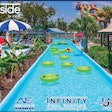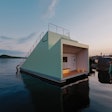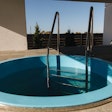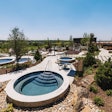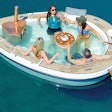
For someone who's never tried it, gathering 20 experts in a room and trying to reach agreement on text for a technical subject may seem fairly straightforward. But in fact, it’s hard to get any group of people to come together and agree on anything, much less people who are at the highest levels of their science and care deeply about their chosen field.
Nevertheless, in service of the pool and spa industry, PHTA’s Recreational Water Quality Committee (RWQC) has been doing just that for years, providing its technical expertise to prepare Fact Sheets to help advance the industry’s knowledge of chemical products, processes and devices that impact the water quality of pools and spas. These Fact Sheets, which are the basis of AQUA’s regular column Tech Notes, are widely utilized at PHTA training courses and can be found on the PHTA website: https://www.phta.org/standards-andcodes/fact-sheets/water-quality/.
RELATED: Operating Guidelines for a Successful Public Pool and Spa Reopening During the COVID-19 Pandemic
There are currently 36 PHTA Fact Sheets available on a number of topics, ranging from abandoned pools to zoonotic diseases. The intention of a Fact Sheet is to cover a topic in a brief manner to inform the reader of critical concepts and precautions, as well as provide references for more in-depth understanding.
THE RECREATIONAL WATER QUALITY COMMITTEE
The PHTA RWQC is a volunteer committee whose membership includes experts in all aspects of swimming pool water quality, from service professionals to microbiologists, chemists and toxicologists. It is currently chaired by Ms. Jody O’Grady of Taylor Technologies. Members are selected based on their ability to provide expertise necessary for the work of the RWQC, while maintaining a balance of knowledge and interests of the industry. They serve five-year terms.
As noted above, the PHTA RWQC is tasked with developing and maintaining authoritative information regarding the water quality maintenance of swimming pools, spas and hot tubs. The responsibilities of the RWQC include, but are not limited to, the following:
1. Review and revise, as necessary, chemical sections in ANSI/PHTA standards.
2. Create and update Fact Sheets.
3. Review and update, as necessary, water quality sections in
- PHTA Builders Manual,
- PHTA Certified Pool Operator (CPO) course material,
- PHTA Genesis course material,
- PHTA Service Tech Manual.
4. Assist PHTA in answering industry technical questions.
5. Assist PHTA in presenting technical education programs for the industry, public health and other industry-related organizations/professions.
6. Assist in the review and selection of abstracts and presentations for the World Aquatic Health Conference (WAHC).
In carrying out the above tasks, the PHTA RWQC endeavors to obtain verifiable, science-based information and utilize the best research available to attain a consensus conclusion on the identified topic. To the extent possible, the documents (including Fact Sheets) include the results of controlled studies, verifiable claims and address all reasonable questions. Overall, Fact Sheets are developed through a consensus process involving input of all members of the RWQC.
DEVELOPMENT OF FACT SHEETS
PHTA RWQC Fact Sheets go through a rigorous development process to be sure that the most accurate and substantiated information is contained within each document.
The first step in drafting a Fact Sheet is to identify the topic for the Fact Sheet. Typically, topics address a specific aspect of water quality including treatment chemicals or maintenance processes and devices. Suggested topics can be presented to the RWQC by PHTA members, RWQC members as well as PHTA leadership. Once a topic is selected by the RWQC, a subject matter expert(s) (SME) is identified as the primary author. Most often the SME is a member of the RWQC; however, depending on the topic, an outside expert may be selected to prepare the initial draft of the Fact Sheet. As noted above, the SME uses verifiable, science-based information and currently available research on the identified topic. Following completion of the initial draft, the author submits the draft document to PHTA Standards staff to coordinate the next steps in the review process.
Following an initial review by the PHTA Marketing & Communications Department, the draft is submitted to the RWQC AQUA Magazine subcommittee which conducts reviews of both Fact Sheets and articles for the magazine. The subcommittee is currently comprised of five RWQC members and is chaired by Mr. Kevin Cox of NSF International. Prior to the subcommittee meeting, the members review the draft document and propose edits. At the subsequent subcommittee meeting, the members discuss and make proposed changes to the document, which may include questions or comments to be addressed by the initial author.
Following initial approval of edits by the RWQC subcommittee, the draft Fact Sheet may be submitted to the full RWQC for consensus review; however, depending on the selected topic, the RWQC chair may elect to have the Fact Sheet sent to a PHTA Council(s) and/ or the PHTA Technical Committee (TC) for review and comment prior to review by the full RWQC. If reviewed by a PHTA Council or TC, PHTA Standards staff consolidate any edits or comments received, which are then addressed by the RWQC subcommittee and document author. Notification is then provided to PHTA Council(s) or the TC regarding rationale for the acceptance or rejection of proposed comments or edits. At this point, the document is ready for review by the full RWQC.
RELATED: The Impact of Chloraminated Tap Water on Pools and Spas
The full RWQC review process is equivalent to the RWQC subcommittee review process where each member has the opportunity to provide comments and edits to the draft Fact Sheet. PHTA Standards staff compile the comments and edits received, which once again, are sent back to the RWQC subcommittee for incorporation into the draft Fact Sheet. Following incorporation of the recommended changes by the RWQC subcommittee, the draft version is circulated to the RWQC members for ballot (along with rationale for comments and edits that were rejected). Upon a successful ballot, the now final Fact Sheet is posted to the PHTA website as well as sent to AQUA Magazine for publication in Tech Notes.
As described above, the development of a RWQC Fact Sheet is a very rigorous process with several layers of review by experts. This process ensures that the RWQC meets the expectations of using the best available science and up-to-date information to reach its conclusions.
The PHTA Recreational Water Quality Committee
Jody O’Grady, Taylor Technologies, Inc., Chair
Terry Arko, HASA, Inc.
Kevin Cox, NSF International
Dr. James Egan, LaMotte Company
Philip Escobedo, Fluidra
Rich Gallo, Pure Swim, Inc.
Kenneth Gregory, Pentair Water Quality Systems
Dr. Christopher M. Kareis, Axiall, A Westlake Company
Dr. Joseph Laurino, Periodic Products, PHTA Board of
Directors Liaison
Touraj Rowhani, Sigura
Terry Snow, TLS Pool Service / (IPSSA Representative)
Dr. Roy Vore, Vore & Associates LLC
John Weber, BioLab, Inc.
Voting Alternates:
Jeff Gaulding, BioLab, Inc.
Ellen Meyer, Sigura
Consultants:
Jana Auringer, Pebble Technology International
Beth Hamil, MicroPlasma Ozone Technologies, Inc.
David Oxley, Pinellas Aquatic Consultation and Education
Dr. Stanley Pickens, Swim-Chem Consulting Services, LLC
This article first appeared in the August 2021 issue of AQUA Magazine — the top resource for retailers, builders and service pros in the pool and spa industry. Subscriptions to the print magazine are free to all industry professionals. Click here to subscribe.






























